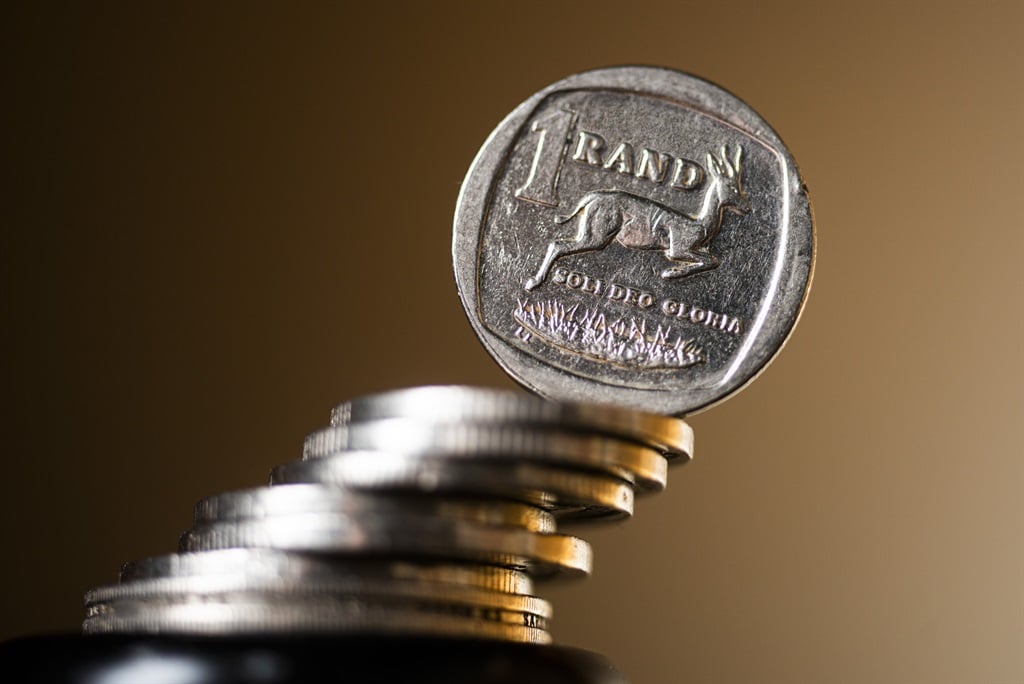(Waldo Swiegers/Bloomberg/ Getty Images)
The rand briefly broke through R17.60/$ to reach its best levels since July 2023 amid dollar weakness on Tuesday morning.
By midday, the local currency was trading at R17.6067/$, after reaching R17.5990 earlier in the morning. The rand traded above R19.30 in February this year.
The dollar traded near its lowest levels of the year on Tuesday against a basket of currencies, on the eve of the expected start to a US easing cycle that markets are betting may begin with an outsized rate cut.
Fed funds futures have rallied to push the chance of a 50-basis-point rate cut to 69%, against 30% a week ago. The odds have narrowed sharply after media reports revived the prospect of a more aggressive easing.
“The rand is still strengthening on positive sentiment about the government of national unity and expectations that the Fed will lower interest rates this week,” said Casparus Treurnicht, portfolio manager and research analyst at Gryphon Asset Management.
“However, I think the South African Reserve Bank will also start cutting interest rates, and perhaps this tide has moved a bit too quickly. To sustain this, there really needs to be better growth from South Africa and quite a few other fundamentals need to improve. For now, it is still just driven by sentiment,” Treurnicht said.
August US retail sales and industrial production figures are expected later today, although all eyes are on the Fed’s two-day meeting which concludes on Wednesday.
“Any sign of weakness in (Tuesday’s US economic data) is only going to reinforce market speculation that there could be a 50 basis points move,” said Jane Foley, senior forex strategist at Rabobank.
“Regardless of which of -25bps or -50bps the (Fed) goes with on Wednesday, we do think that the Fed’s messaging will be ‘dovish,'” said Macquarie strategists in a note to clients.
“The US dollar could weaken against the majors on a very dovish tone, even with a -25bp cut … the largest losses, if any, are still likely to be experienced against the yen,” they said.
“That’s because the contrast between central bank outlooks will remain starkest between the Fed and the BOJ, for the time being.”
The Bank of Japan is expected to keep policy steady on Friday but signal that further interest rate hikes are coming, perhaps turning the next meeting in October into a live one.
The euro hovered around $1.1133 on Tuesday morning, not far from the year’s high of $1.1201.
It has fallen the most this year so has the most room to rally on a dovish turn from the US central bank. A sustained break of 140.00 would open the way to a low from last January at 127.215.
Sterling – the best performing G10 currency this year with a 3.9% rise on the dollar – has also led the charge against the dollar thanks to signs of resilience in Britain’s economy and stickiness in inflation.
It broke above $1.32 on Monday, buying $1.32145 at 08:30 GMT. The Bank of England is generally expected to leave rates on hold at 5% when it meets on Thursday, though markets have priced in a 39% chance of another cut.
The Australian and New Zealand dollars also rallied through Monday and bought $0.6761 and $0.6205, respectively, on Tuesday, as traders focused more on the Fed rather than weekend signs of deepening trouble in China’s sluggish economy.
Chinese markets are closed for the Mid-Autumn Festival break until Wednesday, though the yuan was firm at 7.097 in offshore trade as it settles into a new range.
The US dollar index held at 100.6, not far from its 2024 low made last month at 100.51.
Additional reporting by News24.

